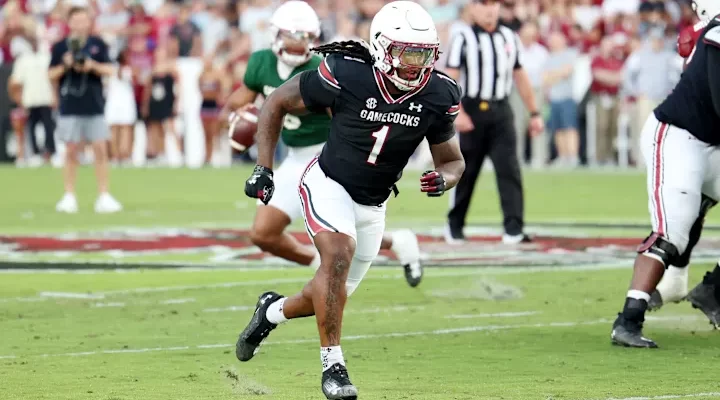South Carolina in Limbo: Rahsul Faison’s NCAA Eligibility Saga Jeopardizes Gamecocks’ 2025 Backfield Stability
With summer training camps set to open and excitement building for the 2025 college football season, South Carolina finds itself caught in a bureaucratic limbo. At the center of the drama is running back Rahsul Faison, whose NCAA eligibility waiver remains unresolved. For a team that has faced roster churn and injury woes in the backfield, Faison’s availability could very well dictate how far the Gamecocks can go this fall.
As the NCAA stalls, the Gamecocks wait — their run game uncertain, their recruiting strategies on pause, and their offensive plans incomplete. For Faison, the delay is even more personal. It may be his last chance to chase NFL dreams.
Faison’s path has been far from conventional. After grayshirting in 2019 and spending time at Lackawanna College and Snow College, he landed at Utah State in 2023. There, he finally showcased his full potential.
- 2023: 736 rushing yards, 5 TDs
- 2024: 1,109 rushing yards, 8 TDs
- Career: Over 1,845 yards in two seasons at the FBS level
His bruising, downhill style coupled with surprising agility made him a top-10 rusher in the Mountain West and a potential Day 3 NFL Draft candidate.
Per NCAA rules, student-athletes generally have five years to complete four seasons of eligibility. A sixth year is possible through a waiver — usually granted for injury, illness, or exceptional circumstances.
Faison’s unique journey, which includes:
- A grayshirt season
- Two years at JUCO (due to COVID disruptions)
- No full-time enrollment until 2021
…makes him a strong candidate for a waiver — if the NCAA sees it that way.
Head Coach Shane Beamer hasn’t been shy about his frustration.
Beamer called the situation “beyond frustrating,” pointing out that the delay hurts not only the team’s planning but Faison’s personal future.
In a strategic move, Faison hired prominent NIL attorney Darren Heitner, who recently helped South Carolina basketball player Myles Stute win a medical hardship waiver.
Heitner believes that Faison’s case is strong, and has stated:
Pavia’s Court Win Changed the Game
Earlier this year, Diego Pavia, a quarterback at LSU, won a legal battle in New Jersey that forced the NCAA to grant him a sixth year. Another player, Jett Elad of Rutgers, followed a similar path.
Both players had JUCO backgrounds and time lost to COVID-related academic delays — just like Faison.
These cases form a powerful legal blueprint. Should the NCAA deny Faison’s waiver, a court challenge could be next.
NFL Dreams in Limbo
Faison is not a fringe player. Scouts believe he could be a late-round NFL pick in 2026 — especially with one more year of strong production in the SEC. But if denied the chance to play:
- His development halts
- His exposure drops
- His draft stock craters
Backup Plan: The NFL Supplemental Draft
Should the NCAA rule against him, Faison could still declare for the 2025 NFL Supplemental Draft — but this is a rare and unpredictable route, often used as a last resort.
Depth Without Certainty
The Gamecocks’ RB room includes:
- Oscar Adaway: Veteran back with extensive reps but history of injuries
- Bradley Dunn: Reliable, but not a lead-back profile
- Matthew Fuller and Jawarn Howell: Young, untested backs with upside
- Isaiah Augustave: Colorado transfer brought in for insurance
Without Faison, this group lacks a true No. 1 option — and reshuffles the team’s offensive identity.
Portal Strategy in Flux
South Carolina skipped pursuing a high-profile running back during the spring portal window — under the assumption that Faison would be cleared. The result? A thin backfield and growing pressure.
Recruits watching this drama may wonder: Can USC promise playing time and roster clarity? Or is the NCAA process too volatile?
A Run-First Offense Needs a Workhorse
OC Dowell Loggains is entering Year 3 in Columbia, and his playbook thrives when there’s a powerful back to anchor drives. Faison would’ve been that — someone to wear down SEC defenses and protect QB LaNorris Sellers.
Without him, the Gamecocks may need to rely more on misdirection, screen plays, and QB runs.
“It’s Stressful” — Faison Speaks
In a rare public comment, Faison admitted to reporters:
He’s stayed in Columbia all offseason, practicing and working out with teammates. But until a ruling is made, it’s all hypothetical.
Six Months with No Decision
Faison submitted his waiver in January 2025. The NCAA acknowledged receipt. Yet now, in July, no ruling has been issued.
This has reignited criticism that the NCAA:
- Lacks transparency
- Moves at a glacial pace
- Disrespects player timelines
For a governing body facing increasing legal scrutiny, Faison’s case may become a flashpoint.
“Let the Kid Play” — A Rallying Cry
Gamecock fans and even rival SEC programs have voiced support for Faison. Social media is ablaze with hashtags like #FreeFaison and #LetHimPlay, echoing the sentiment that athletes shouldn’t be held hostage by bureaucratic red tape.
- Faison files a lawsuit, citing Pavia and Elad as precedent
- A temporary injunction allows him to play while the court decides
- NFL Supplemental Draft becomes his last option
South Carolina, meanwhile, would be forced to lean on Augustave or Adaway — a step down in explosiveness and experience.
Reform Is Long Overdue
Faison’s case may ignite a policy shift toward:
- Clearer timelines for waiver decisions
- More weight given to JUCO and COVID-disrupted careers
- Legal pressure to reduce arbitrary rulings
As athlete rights grow, the NCAA’s power to stall decisions is shrinking.
Options Moving Forward
If a decision comes soon, USC can:
- Solidify their RB depth chart
- Shift offensive schemes around Faison
- Regain recruiting momentum in the backfield
If not, expect them to accelerate development of younger backs — or scour the late transfer/juco markets for emergency help.
At its core, this saga is about more than football.
It’s about a young man who beat the odds, climbed through the JUCO ranks, and now may be punished by a system too slow to keep up. It’s about a program caught in uncertainty — and a sport increasingly dictated by legal battles and eligibility politics.
The Gamecocks don’t have time for delays. With fall camp around the corner and Week 1 approaching, they need clarity — and so does Faison. Whether the NCAA acts or a court steps in, this case may become a landmark moment for player rights and college football eligibility.
The clock is ticking.



